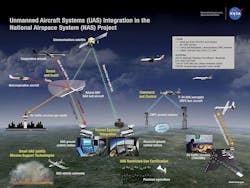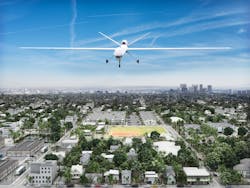RTI debuts DO-178C Level A certification evidence package for safety-critical connectivity platform
SUNNYVALE, Calif., 29 Sept. 2015. Real-Time Innovations (RTI) is introducing a commercial off-the-shelf (COTS) DO-178C Level A Certification Package for Connext DDS Cert, designed to help companies reduce the time, cost, and risk required to develop, integrate, and certify a safety-critical distributed application. This COTS certification package provides the evidence an aviation authority, such as the U.S. Federal Aviation Administration (FAA), requires when certifying the airworthiness of an avionics system built using Connext DDS Cert.
Company officials call Connext DDS Cert “the first connectivity platform built on the Data Distribution Service (DDS) standard to complete a DO-178C Design Assurance Level (DAL) A certification evidence package and be placed into a production platform.”
Aviation software image courtesy Shutterstock.
Avionics systems have traditionally used custom software to communicate between different applications and subsystems, such as radars, displays, communication, and mission systems. Developing the software and the necessary certification evidence can take months to years of effort and cost on the order of $100 per line of code. Connext DDS Cert provides a COTS certification package and supports the DDS standard, helping make applications easier to develop, integrate, evolve, and maintain than those using custom and proprietary solutions, officials say.
This DO-178C DAL A COTS certification evidence package benefits both military and commercial unmanned aircraft systems (UAS), also known as drones, unmanned air vehicles (UAVs), small unmanned aerial systems (sUAS), and remotely piloted aircraft systems (RPAS). In the U.S., UAVs have only been allowed to fly within line-of-sight of an observer, either on the ground or in a chase plane; many other restrictions have prohibited them from operating in the civilian National Airspace System (NAS). These restrictions limit their utility and make them expensive to operate. In order to unleash the potential of UAVs and sUAS platforms by enabling their integration into public airspace, they need to comply with civilian standards, such as DO-178C. Connext DDS Cert makes it easier and more cost-effective to perform this integration particularly since most existing drone software was not designed to satisfy DO-178C requirements, according to company officials.
“As avionics systems, autonomous platforms, and UAVs continue to advance into more critical environments, security, safety, reliability, and performance are crucial capabilities that need to be proven,” says Chip Downing, senior director of business development for aerospace & defense at Wind River in Alameda, Calif. “RTI’s Connext DDS Cert software with COTS DO-178C certification evidence will provide the production-proven connectivity platform needed to realize the tremendous commercial opportunity of harvesting data in next-generation IoT platforms.”
“In addition to benefiting avionics, this COTS certification evidence package provides a foundation for certification using other Industrial IoT (Internet of Things) standards such as those for manufacturing and energy systems, medical devices, and automotive communications and control components,” says David Barnett, VP of products and markets at RTI. “We look forward to continuing to expand our technology offerings to help our customers and partners leverage the power of the Industrial Internet.”
SRC Inc., a research and development corporation in North Syracuse, N.Y., is designing, integrating and testing a DO-178C Level B system of systems across VxWorks, Linux, and QNX using RTI’s DO-178C Level A Connext DDS Cert and Connext DDS products. “Each system installation contains up to 32 subsystems that all communicate via DDS in real time. A portion of the subsystems are co-located with the rest located miles away,” explains Greg Polhamus, software engineering manager, SRC Inc. “We are successfully using RTI DDS for our inter-process and inter-subsystem communications, recording, and in our DO-178C automated test environment that runs on Windows. Having RTI’s Connext DDS Cert product available allows us to move forward with our certification efforts with system deployment scheduled in 2016!”
RTCA DO-178C, “Software Considerations in Airborne Systems and Equipment Certification,” is recognized as one of the most stringent safety standards in the world, and has decades of successful implementations by global aerospace companies. DO-178C is published by RTCA in the US and published as ED-12C by EUROCAE in Europe. The document is used by the FAA, European Aviation Safety Agency (EASA), Air Transport Canada, and other aviation safety agencies world-wide for the approval of safety-critical avionics software.
DO-178C defines five levels of criticality, based on the effect of a software failure. Level A is the most stringent and applicable to the most critical avionics systems. Connext DDS Cert was developed and verified to level A, allowing it to be used on a system of at any level.
RTI provides the connectivity platform for the Industrial Internet of Things. RTI Connext messaging software forms the core nervous system for smart, distributed applications. RTI Connext DDS allows devices to intelligently share information and work together as one integrated system. RTI was named "The Most influential Industrial Internet of Things Company" in 2014 by Appinions and published in Forbes.
RTI customers span the breadth of the Internet of Things, including medical, energy, mining, air traffic control, trading, automotive, unmanned systems, industrial SCADA, naval systems, air and missile defense, ground stations, and science. The total value of system designs that trust RTI for their fundamental architecture exceeds $1 trillion.
RTI is committed to open standards, open community source and open architecture. RTI provides the leading implementation of the Object Management Group (OMG) Data Distribution Service (DDS) standard.
RTI is a global embedded middleware provider, privately held, and headquartered in Sunnyvale, California.
You might also like:
Subscribe today to receive all the latest aerospace technology and engineering news, delivered directly to your e-mail inbox twice a week (Tuesdays and Thursdays). Sign upfor your free subscription to the Intelligent Inbox e-newsletter at http://www.intelligent-aerospace.com/subscribe.html.
Connect with Intelligent Aerospace on social media: Twitter (@IntelligentAero), LinkedIn,Google+, and Instagram.



